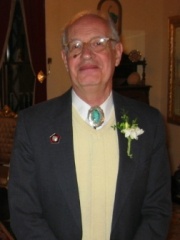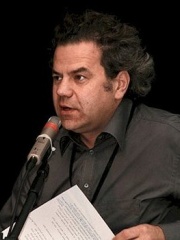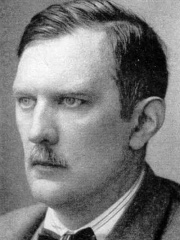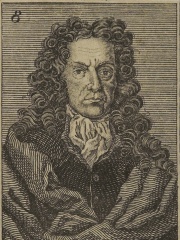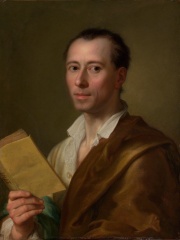
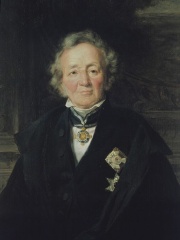
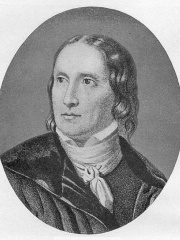

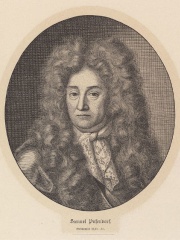
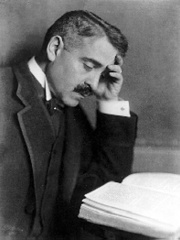
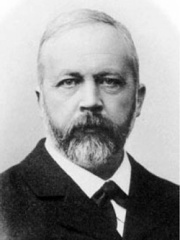
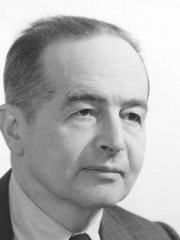
The Most Famous
HISTORIANS from Germany
This page contains a list of the greatest German Historians. The pantheon dataset contains 561 Historians, 62 of which were born in Germany. This makes Germany the birth place of the 2nd most number of Historians.
Top 10
The following people are considered by Pantheon to be the top 10 most legendary German Historians of all time. This list of famous German Historians is sorted by HPI (Historical Popularity Index), a metric that aggregates information on a biography's online popularity. Visit the rankings page to view the entire list of German Historians.

1. Johann Joachim Winckelmann (1717 - 1768)
With an HPI of 75.91, Johann Joachim Winckelmann is the most famous German Historian. His biography has been translated into 48 different languages on wikipedia.
Johann Joachim Winckelmann (US: VINK-əl-mahn; German: [ˈjoːhan ˈjoːaxɪm ˈvɪŋkl̩man]; 9 December 1717 – 8 June 1768) was a German art historian and archaeologist. He was a pioneering Hellenist who first articulated the differences between Greek, Greco-Roman and Roman art. "The prophet and founding hero of modern archaeology", Winckelmann was one of the founders of scientific archaeology and first applied the categories of style on a large, systematic basis to the history of art. Many consider him the father of the discipline of art history. He was one of the first to separate Greek Art into periods and time classifications. He had a decisive influence on the rise of the Neoclassical movement during the late 18th century. His writings influenced not only a new science of archaeology and art history but Western painting, sculpture, literature and even philosophy. Winckelmann's History of Ancient Art (1764) was one of the first books written in German to become a classic of European literature. His subsequent influence on Gotthold Ephraim Lessing, Johann Gottfried Herder, Johann Wolfgang von Goethe, Friedrich Hölderlin, Heinrich Heine, Friedrich Nietzsche, Stefan George and Oswald Spengler has been provocatively called "the Tyranny of Greece over Germany". Winckelmann was homosexual, and open homoeroticism informed his writings on aesthetics. In 1752, he mentioned the "lust" which could be experienced with the "divine monarch" (i.e. Frederick the Great) in Potsdam in a similar way as in "Athens and Sparta", and which he could enjoy so immensely that he would never again be allowed to. His homosexuality was recognized by his contemporaries, such as Goethe. In 1768, at the age of 50, he was murdered by a fellow guest at his hotel for reasons that remain unclear.

2. Leopold von Ranke (1795 - 1886)
With an HPI of 75.51, Leopold von Ranke is the 2nd most famous German Historian. His biography has been translated into 57 different languages.
Leopold von Ranke (21 December 1795 – 23 May 1886) was a German historian and a founder of modern source-based history. He was able to implement the seminar teaching method in his classroom and focused on archival research and the analysis of historical documents. Building on the methods of the Göttingen school of history, he was the first to establish a historical seminar. Ranke set the standards for much of later historical writing, introducing such ideas as reliance on primary sources (empiricism), an emphasis on narrative history and especially international politics (Außenpolitik). He was ennobled in 1865, with the addition of a "von" to his name. Ranke also had a great influence on Western historiography and is considered a symbol of the quality of 19th century German historical studies. Ranke, influenced by Barthold Georg Niebuhr, was very talented in constructing narratives without exceeding the limits of historical evidence. His critics have noted the influence of Lutheranism in guiding his work, especially his belief that God's actions were manifest in the lives of men and history, a viewpoint that shaped his ideas that the German Empire was a manifestation of God's intent.

3. Friedrich Carl von Savigny (1779 - 1861)
With an HPI of 73.18, Friedrich Carl von Savigny is the 3rd most famous German Historian. His biography has been translated into 40 different languages.
Friedrich Carl von Savigny (21 February 1779 – 25 October 1861) was a German jurist and historian.

4. Adam of Bremen (1100 - 1080)
With an HPI of 72.91, Adam of Bremen is the 4th most famous German Historian. His biography has been translated into 48 different languages.
Adam of Bremen (Latin: Adamus Bremensis; German: Adam von Bremen; before 1050 – 12 October 1081/1085) was a German medieval chronicler. He lived and worked in the second half of the eleventh century. Adam is most famous for his chronicle Gesta Hammaburgensis ecclesiae pontificum (Deeds of Bishops of the Hamburg Church). He was "one of the foremost historians and early ethnographers of the medieval period". In his chronicle, he included a chapter mentioning the Norse outpost of Vinland, and was thus the first European to write about the New World.
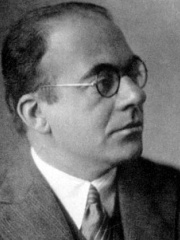
5. Erwin Panofsky (1892 - 1968)
With an HPI of 72.29, Erwin Panofsky is the 5th most famous German Historian. His biography has been translated into 43 different languages.
Erwin Panofsky (March 30, 1892 – March 14, 1968) was a German-Jewish art historian whose work represents a high point in the modern academic study of iconography, including his hugely influential Renaissance and Renascences in Western Art and his seminal Early Netherlandish Painting. Panofsky's ideas were highly influential in intellectual history in general, particularly in his use of historical ideas to interpret artworks and vice versa. Many of his books are still in print, including Studies in Iconology: Humanist Themes in the Art of the Renaissance (1939), Meaning in the Visual Arts (1955), and his 1943 study The Life and Art of Albrecht Dürer. His academic career was pursued mostly in the U.S. after the rise of the Nazi regime.

6. Samuel von Pufendorf (1632 - 1694)
With an HPI of 71.49, Samuel von Pufendorf is the 6th most famous German Historian. His biography has been translated into 34 different languages.
Samuel von Pufendorf (; German: [ˈpuːfəndɔʁf]; 8 January 1632 – 26 October 1694) was a German jurist, political philosopher, economist and historian. He was born Samuel Pufendorf and ennobled in 1694; he was made a baron by Charles XI of Sweden a few months before his death at age 62. Among his achievements are his commentaries and revisions of the natural law theories of Thomas Hobbes and Hugo Grotius. His political concepts are part of the cultural background of the American Revolution. Pufendorf is seen as an important precursor of the German Enlightenment. He was involved in constant quarrels with clerical circles and frequently had to defend himself against accusations of heresy, despite holding largely traditional Christian views on matters of dogma and doctrine.

7. Aby Warburg (1866 - 1929)
With an HPI of 71.01, Aby Warburg is the 7th most famous German Historian. His biography has been translated into 33 different languages.
Aby Moritz Warburg (June 13, 1866 – October 26, 1929) was a German art historian and cultural theorist who founded the Kulturwissenschaftliche Bibliothek Warburg (Warburg Library for Cultural Studies), a private library, which was later moved to the Warburg Institute, London. At the heart of his research was the legacy of the classical world, and the transmission of classical representation, in the most varied areas of Western culture through to the Renaissance. Warburg described himself as: "Amburghese di cuore, ebreo di sangue, d'anima Fiorentino" ('Hamburger at heart, Jew by blood, Florentine in spirit').

8. Julius Wellhausen (1844 - 1918)
With an HPI of 67.93, Julius Wellhausen is the 8th most famous German Historian. His biography has been translated into 34 different languages.
Julius Wellhausen (17 May 1844 – 7 January 1918) was a German biblical scholar and orientalist. In the course of his career, his research interest moved from Old Testament research through Islamic studies to New Testament scholarship. Wellhausen contributed to the composition history of the Pentateuch/Torah and studied the formative period of Islam. For the former, he is credited as one of the originators of the documentary hypothesis.

9. Erich Auerbach (1892 - 1957)
With an HPI of 67.32, Erich Auerbach is the 9th most famous German Historian. His biography has been translated into 34 different languages.
Erich Auerbach (German: [ˈaʊɐbax]; 9 November 1892 – 13 October 1957) was a German philologist and comparative scholar and critic of literature. His best-known work is Mimesis: The Representation of Reality in Western Literature, a history of representation in Western literature from ancient to modern times frequently cited as a classic in the study of realism in literature. Along with Leo Spitzer, Auerbach is widely recognized as one of the foundational figures of comparative literature.
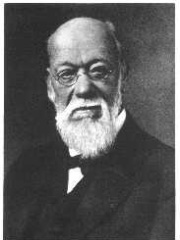
10. Hermann Alexander Diels (1848 - 1922)
With an HPI of 66.90, Hermann Alexander Diels is the 10th most famous German Historian. His biography has been translated into 28 different languages.
Hermann Alexander Diels (German: [diːls]; 18 May 1848 – 4 June 1922) was a German classical scholar, who was influential in the area of early Greek philosophy and is known for his standard work Die Fragmente der Vorsokratiker. Diels helped to import the term Presocratic into classical scholarship and developed the Diels–Kranz numbering system for ancient Greek Pre-Socratic texts.
People
Pantheon has 62 people classified as German historians born between 1100 and 1967. Of these 62, 4 (6.45%) of them are still alive today. The most famous living German historians include Rainer Zitelmann, Gerhard Weinberg, and Oliver Grau. The most famous deceased German historians include Johann Joachim Winckelmann, Leopold von Ranke, and Friedrich Carl von Savigny. As of April 2024, 1 new German historians have been added to Pantheon including Andreas Umland.
Living German Historians
Go to all RankingsRainer Zitelmann
1957 - Present
HPI: 53.84
Gerhard Weinberg
1928 - Present
HPI: 48.95
Oliver Grau
1965 - Present
HPI: 47.87
Andreas Umland
1967 - Present
HPI: 47.58
Deceased German Historians
Go to all RankingsJohann Joachim Winckelmann
1717 - 1768
HPI: 75.91
Leopold von Ranke
1795 - 1886
HPI: 75.51
Friedrich Carl von Savigny
1779 - 1861
HPI: 73.18
Adam of Bremen
1100 - 1080
HPI: 72.91
Erwin Panofsky
1892 - 1968
HPI: 72.29
Samuel von Pufendorf
1632 - 1694
HPI: 71.49
Aby Warburg
1866 - 1929
HPI: 71.01
Julius Wellhausen
1844 - 1918
HPI: 67.93
Erich Auerbach
1892 - 1957
HPI: 67.32
Hermann Alexander Diels
1848 - 1922
HPI: 66.90
Arthur Moeller van den Bruck
1876 - 1925
HPI: 66.36
Christoph Cellarius
1638 - 1707
HPI: 65.35
Newly Added German Historians (2025)
Go to all RankingsOverlapping Lives
Which Historians were alive at the same time? This visualization shows the lifespans of the 25 most globally memorable Historians since 1700.


